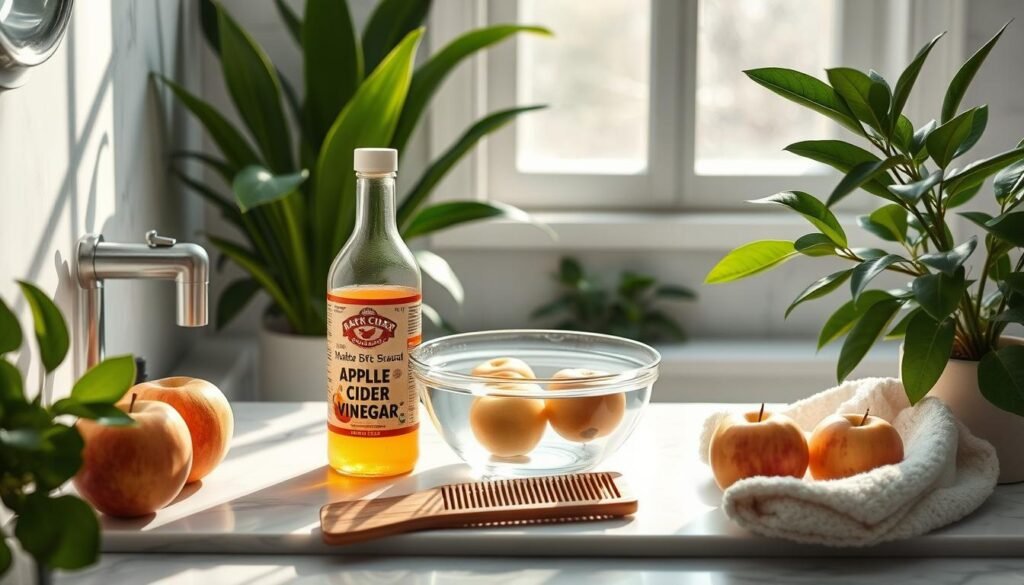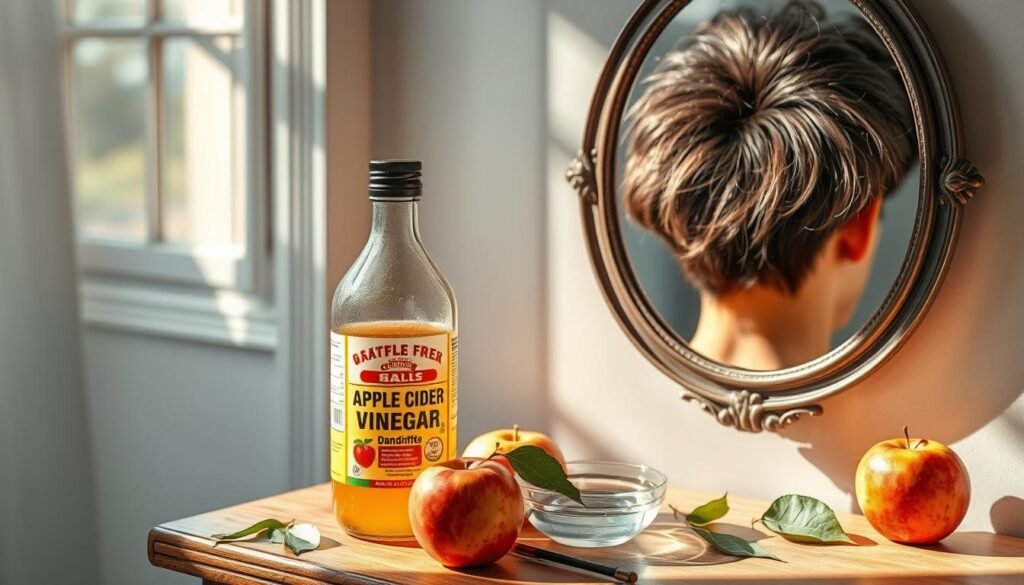Did you know about half of all adults will experience dandruff? This issue, marked by an itchy and flaky scalp, can lower one’s self-esteem. People are now turning to natural solutions for health and beauty, making apple cider vinegar (ACV) more popular. ACV is known for its use in cooking and its benefits as a scalp treatment. This piece looks at how apple cider vinegar can level out scalp pH. It also covers the many apple cider vinegar benefits for your hair care routine.
ACV can restore the pH balance of your scalp and has antimicrobial traits. These can help your scalp stay healthy. We will explore how this natural option works against dandruff, the different types of ACV, and the right way to use it in your hair care. With products like Bragg’s Organic Raw Apple Cider Vinegar easily found, beating dandruff might be simpler than expected.
Key Takeaways
- Approximately 50% of adults are affected by dandruff.
- Apple cider vinegar may assist in balancing scalp pH, a vital factor for scalp health.
- ACV possesses antimicrobial properties that could support overall scalp health.
- Bragg’s Organic Raw Apple Cider Vinegar is a popular choice for hair care remedies.
- Incorporating ACV into hair care routines can lead to healthier hair and potentially alleviate dandruff symptoms.
- Understanding the relationship between stress and dandruff can enhance your overall well-being; managing stress is crucial.
Understanding Dandruff
Dandruff is a common scalp condition that causes flaky skin on your head. It can make your scalp itch, making you look for itchy scalp relief. The main reason for dandruff is when the cycle of skin renewal is off, causing dead skin to pile up. This issue can hurt how you feel about your scalp health and self-esteem.
Different things can cause dandruff, like dry or oily skin, and reactions to hair products. If your skin is dry, your flakes will likely be small and dry. But with oily skin, the flakes can be big and sticky. Knowing this helps in treating dandruff the right way for each person.
It’s also key to know how bad your dandruff is. Some might have light flaking sometimes, but others have it worse, affecting their everyday life. Finding the right treatment helps better scalp health.
What Causes Dandruff?
Dandruff comes from several factors that affect the scalp. A key cause is seborrheic dermatitis. This condition makes the scalp too oily. Because of this, skin cells shed quickly. This often leads to imbalance and irritation, causing flakes.
Another big factor is an overgrowth of Malassezia, a yeast on the scalp. If this yeast grows too much, it causes inflammation. This makes people seek relief for an itchy scalp. Scalp eczema is another issue, leading to noticeable flaking.
Fungal infections can also make dandruff worse. Spotting these infections early is crucial for effective treatment. Changes in the environment or harsh weather can make the scalp more sensitive. Stress can also play a big part by increasing oil production and scalp irritation.
Eating a poor diet can impact your scalp’s health too. It’s important to get enough vitamins and minerals. Hair care routines matter as well. Using strong shampoos or not washing your hair enough can make dandruff worse. Also, genetics might make some people more prone to dandruff, showing the need for various treatment methods.
| Causes of Dandruff | Details |
|---|---|
| Seborrheic Dermatitis | Characterized by oily scalp leading to flaking |
| Malassezia Overgrowth | Yeast causing irritation and inflammation |
| Scalp Eczema | Results in red, itchy, and flaky patches on the scalp |
| Fungal Infections | Can exacerbate flaking and irritation |
| Environmental Factors | Seasonal changes and weather exposure affecting sensitivity |
| Stress | May increase oil production, worsening dandruff |
| Poor Diet | Lack of vital nutrients leading to scalp issues |
| Hair Care Routine | Use of harsh products or irregular washing contributing to buildup |
| Genetics | Predisposition to dandruff can run in families |
How Apple Cider Vinegar Helps Balance Scalp pH
Keeping a balanced pH on your scalp is key for good hair health. A pH that is not balanced can cause dandruff, irritation, and itchiness. Your scalp’s pH should be between 4.5 and 5.5 to be healthy.
This balance supports a good environment for hair to grow. It also stops harmful microorganisms from growing.
Importance of pH Balance for Scalp Health
Having a balanced pH maintains the scalp’s defense barrier. If the pH is too high, your scalp can get dry and irritated. If it’s too low, it may create a breeding ground for fungus, causing dandruff. Using remedies that balance pH, like apple cider vinegar, helps keep your scalp healthy.
How ACV Restores Natural pH Levels
Apple cider vinegar has acetic acid, which lowers scalp pH. Adding ACV to your hair care can fight dandruff and improve scalp health. Research shows ACV can make the scalp healthier and better for hair.
| Scalp pH Levels | Effects of Imbalance | Benefits of ACV |
|---|---|---|
| 4.5 – 5.5 | Healthy scalp, moisture retention | Restores natural pH levels |
| Greater than 5.5 | Dryness, irritation | Balances scalp environment |
| Less than 4.5 | Scalp irritation, fungal growth | Slows fungal reproduction |
Introducing Apple Cider Vinegar in Hair Care
Apple cider vinegar is a top choice for healthy hair care. It boosts shine, cuts down frizz, and makes detangling easy. Here, we’ll explore why apple cider vinegar is great. We’ll also look at different ways you can use it.
Why Choose Apple Cider Vinegar?
Apple cider vinegar is great for your hair for many reasons. Apple cider vinegar benefits include:
- It makes your hair shiny and vibrant.
- It smoothens your hair, reducing frizz.
- Detangling becomes easier, managing hair better.
- It strengthens hair for a healthier appearance.
These benefits make apple cider vinegar a favorite. It really helps in keeping hair healthy.
Different Forms of ACV for Treatment
Different forms of apple cider vinegar are available. You can choose what works best for you:
| Form of ACV | Description | Usage Tips |
|---|---|---|
| Undiluted Liquid | Pure apple cider vinegar for direct application. | Do a patch test before using it to check skin compatibility. |
| Sprays | Convenient pre-mixed solutions for easy application. | Apply on damp hair after washing for the best effect. |
| ACV-Infused Products | Shampoos or conditioners with apple cider vinegar. | Include in your regular hair care for ongoing benefits. |

Apple Cider Vinegar Benefits for Hair
Apple cider vinegar is great, not just in the kitchen but for dandruff too. It helps get rid of product build-up and balances your scalp’s pH. Its antibacterial powers also make your scalp a better place for hair to grow, while fighting off dandruff causes.
Another big plus of apple cider vinegar is how it makes your scalp and hair moister. This means less flakiness and a scalp that looks healthy and happy. People often see a big difference in their scalp after using apple cider vinegar in their hair care routine.
Studies show that apple cider vinegar’s acetic acid boosts blood flow in the scalp. This can help your hair to grow better. Lots of people say their hair changed for the better after using it regularly.
Comparative Analysis of Treatments for Dandruff
| Treatment | Effectiveness | Additional Benefits |
|---|---|---|
| Apple Cider Vinegar | High | Moisturizes, Contains Antimicrobial Properties |
| Medicated Shampoos | Variable | Specialized Active Ingredients |
| Essential Oils | Moderate | Aromatic, May Nourish Hair |
Using apple cider vinegar in your hair care is a great way to tackle dandruff head-on. Its numerous benefits make it an excellent choice for anyone’s beauty kit. You’ll feel more confident about how your scalp and hair look.
How to Use Apple Cider Vinegar as a Healthy Hair Treatment
Apple cider vinegar is great for your hair. It makes the scalp healthier and promotes strong hair. Here’s a guide to making and using an apple cider rinse.
Vinegar Hair Rinse Tutorial
Here are easy steps to create your own vinegar hair rinse:
- Gather Ingredients: Mix 1 part apple cider vinegar with 3 parts water. Use 1 cup of vinegar and 3 cups of water, for example.
- Customize (Optional): Add essential oils like lavender or tea tree for more benefits.
- Shampoo First: Start by washing your hair with a soft shampoo. Make sure to rinse it well.
- Apply the Rinse: Spread the vinegar mix over your scalp and hair. Massage it in to help with blood flow.
- Leave In: Let it sit for a few minutes. This is good for oily or dandruff-prone scalp.
- Rinse Out: Rinse with cool water to make your hair shiny and close the cuticles.
- Frequency: For the best results, use this rinse one to two times a week.

This rinse cleans the scalp and gets rid of product buildup. It’s perfect for natural scalp care. For more about how apple cider vinegar helps with hair, check out more information here.
| Benefits | Effects |
|---|---|
| Promotes Healthy Scalp | Reduces dandruff and irritation |
| Enhances Shine | Seals hair cuticles, improves luster |
| Detangles Hair | Makes hair easier to manage and style |
| Prevents Hair Loss | Strengthens hair follicles |
Adjusting the mix can create the perfect rinse for your hair. It’s a simple and effective way to keep your scalp healthy.
Other Natural Scalp Treatments
Looking into other ways besides apple cider vinegar helps with dandruff. It makes your hair care better. You can try tea tree oil, coconut oil, and aloe vera. They help keep your scalp healthy. Each one has special benefits and ways to use it. So, they’re worth thinking about.
Tea tree oil is famous for fighting fungi and bacteria. To use, mix a few drops with a carrier oil, like coconut oil. Then, rub into your scalp. It’s a great way to tackle dandruff.
Coconut oil is another top choice. It’s full of fatty acids that feed your scalp and hair. It can also calm irritation. This makes it perfect for anyone with sensitive skin.
Aloe vera is known for its calming and hydrating effects. Putting fresh aloe vera gel on your scalp helps with dryness. It keeps your scalp healthy.
Baking soda is a mild exfoliant. It can take away dead skin and buildup. Making a paste with water makes a natural scalp scrub. It’s good for keeping your scalp in top condition.
Using different scalp care treatments helps you find what works best for you. There are many tips for fighting dandruff, including store-bought and natural choices. For more information, you can check out detailed advice here.
Tips for Preventing Dandruff
Keeping your scalp healthy is key to avoiding dandruff. A few simple actions can make a big difference in fighting off flakes.

- Balanced Diet: Eat foods rich in omega-3 fatty acids like fatty fish, walnuts, and flaxseeds to improve scalp health.
- Stay Hydrated: Drinking enough water is good for your skin and scalp.
- Manage Stress: Methods like yoga or meditation can lower stress and benefit your scalp.
- Regular Hair Care Routine: A stable hair care routine keeps your scalp clean and healthy.
- Choosing the Right Products: Use hair care items that are free from sulfates and harsh chemicals to avoid irritation and enhance scalp health.
Following these tips will lay a strong foundation for dandruff prevention. It leads to a healthier scalp and boosts your overall well-being.
Conclusion
The evidence shows apple cider vinegar is great for scalp health. It fights dandruff, balances pH levels, strengthens hair, and controls bacteria. Adding apple cider vinegar to your hair care routine could be a game-changer.
Using apple cider vinegar as a rinse can also boost hair vitality. Remember, finding what’s best for your hair might take some time and trials. For more information on apple cider vinegar and hair care, check out this link here.
Choosing natural remedies and customizing your hair care plan is key. With patience and the right choices, you can discover the perfect solution for your hair. This journey towards natural hair care is truly exciting.